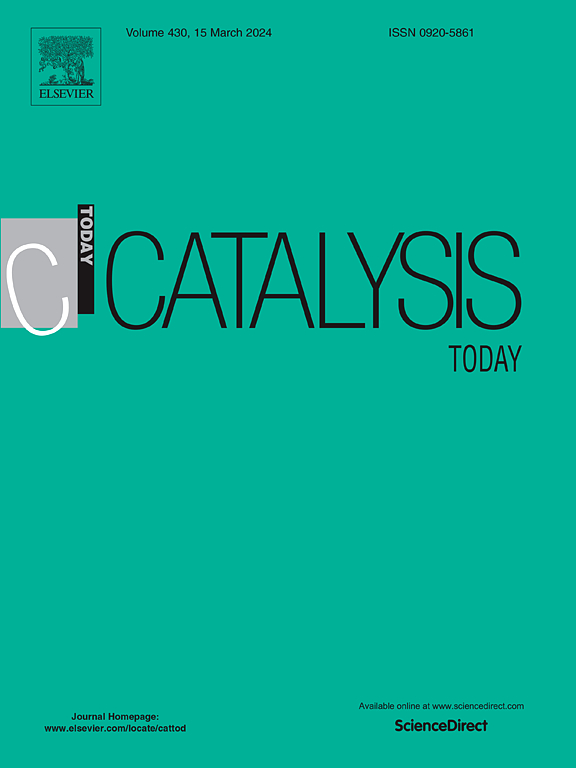废旧加氢处理催化剂上塑料废热解油的连续加氢
IF 5.2
2区 化学
Q1 CHEMISTRY, APPLIED
引用次数: 0
摘要
本文研究了利用炼油厂常用的加氢处理催化剂对垃圾衍生燃料(RDF)热解油进行连续加氢。苯乙烯和甲基苯乙烯是导致热解油稳定性低的主要胶质前体,其加氢是处理的主要范围。实验结果表明,该催化剂在中等温度下具有较高的催化活性,芳烃的部分加氢反应优于催化裂化和低聚反应。然而,这两种不希望的反应都会导致焦炭的形成,从而逐渐使催化剂失活。失活研究表明,炼化用催化剂上的焦炭沉积物甚至可以对催化剂的稳定性产生积极影响,堵塞氧化铝酸位,甚至提高活性相的热稳定性。催化剂的热再生也导致目标反应的活性催化剂,但催化剂的稳定性较低,在低温下形成焦的速率最高,在最高研究温度下活性相的活性较低。根据考虑一级主加氢和二级失活动力学的失活动力学模型对结果进行了分析。本文章由计算机程序翻译,如有差异,请以英文原文为准。
Continuous hydrogenation of plastic wastes pyrolysis oil over used hydrotreatment catalysts
The continuous hydrogenation of refuse-derived fuel (RDF) pyrolysis oil using hydrotreating catalysts previously utilized in oil refineries is studied in this article. The hydrogenation of styrene and methyl-styrene, the primary gum precursors contributing to the low stability of the pyrolysis oil, is the main scope of the treatment. Experimental results demonstrate the catalyst's high activity at moderate temperatures, with partial hydrogenation of aromatic olefins prevailing over catalytic cracking and oligomerization. However, both undesired reactions result in coke formation, which gradually deactivates the catalyst. Deactivation studies reveal that the coke deposits on the refinery-used catalyst can even have positive effects on catalyst stability, blocking the alumina acid sites and even increasing the thermal stability of the active phase. Thermal regeneration of the catalysts also leads to active catalysts for the target reactions, but the stability of the catalyst is lower, with highest coke formation rates at low temperatures, and lower activity of the active phases at the highest studied temperatures. Results are analysed in terms of a deactivation kinetic modelling considering first-order for the main hydrogenations and second-order deactivation kinetics.
求助全文
通过发布文献求助,成功后即可免费获取论文全文。
去求助
来源期刊

Catalysis Today
化学-工程:化工
CiteScore
11.50
自引率
3.80%
发文量
573
审稿时长
2.9 months
期刊介绍:
Catalysis Today focuses on the rapid publication of original invited papers devoted to currently important topics in catalysis and related subjects. The journal only publishes special issues (Proposing a Catalysis Today Special Issue), each of which is supervised by Guest Editors who recruit individual papers and oversee the peer review process. Catalysis Today offers researchers in the field of catalysis in-depth overviews of topical issues.
Both fundamental and applied aspects of catalysis are covered. Subjects such as catalysis of immobilized organometallic and biocatalytic systems are welcome. Subjects related to catalysis such as experimental techniques, adsorption, process technology, synthesis, in situ characterization, computational, theoretical modeling, imaging and others are included if there is a clear relationship to catalysis.
 求助内容:
求助内容: 应助结果提醒方式:
应助结果提醒方式:


